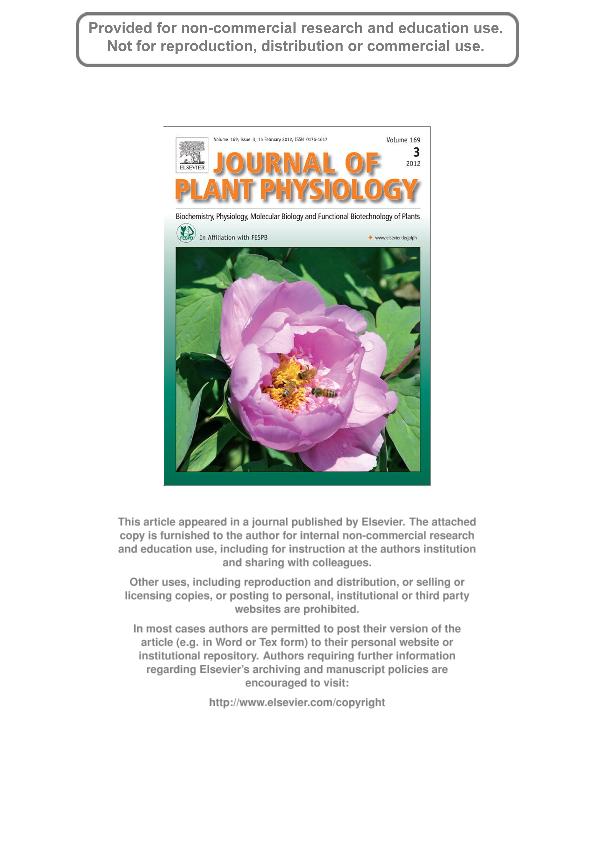Mostrar el registro sencillo del ítem
dc.contributor.author
Carassay, Luciano Raul

dc.contributor.author
Bustos, Dolores Angela

dc.contributor.author
Golberg, Alberto Daniel

dc.contributor.author
Taleisnik, Edith

dc.date.available
2023-02-28T14:52:36Z
dc.date.issued
2012-02
dc.identifier.citation
Carassay, Luciano Raul; Bustos, Dolores Angela; Golberg, Alberto Daniel; Taleisnik, Edith; Tipburn in salt-affected lettuce (Lactuca sativa L.) plants results from local oxidative stress; Elsevier Gmbh; Journal of Plant Physiology; 169; 3; 2-2012; 285-293
dc.identifier.issn
0176-1617
dc.identifier.uri
http://hdl.handle.net/11336/189088
dc.description.abstract
Tipburn in lettuce is a physiological disorder expressed as a necrosis in the margins of young developing leaves and is commonly observed under saline conditions. Tipburn is usually attributed to Ca 2+ deficiencies, and there has very limited research on other mechanisms that may contribute to tipburn development. This work examines whether symptoms are mediated by increased reactive oxygen species (ROS) production.Two butter lettuce (Lactuca sativa L.) varieties, Sunstar (Su) and Pontina (Po), with contrasting tipburn susceptibility were grown in hydroponics with low Ca 2+ (0.5mM), and with or without 50mM NaCl. Tipburn symptoms were observed only in Su, and only in the saline treatment. Tipburn incidence in response to topical treatments with Ca 2+ scavengers, Ca 2+ transport inhibitors, and antioxidants was assessed. All treatments were applied before symptom expression, and evaluated later, when symptoms were expected to occur. Superoxide presence in tissues was determined with nitro blue tetrazolium (NBT) and oxidative damage as malondialdehyde (MDA) content. Superoxide dismutase (SOD), catalase (CAT) and ascorbate peroxidase (APX) activities were assayed.Under control and saline conditions, tipburn could be induced in both varieties by topical treatments with a Ca 2+ scavenger (EGTA) and Ca 2+ transport inhibitors (verapamil, LaCl 3) and reduced by supplying Ca 2+ along with a ionophore (A 23187). Tipburn symptoms were associated with locally produced ROS. O 2 - and oxidative damage significantly increased in leaf margins before symptom expression, while topical antioxidant applications (Tiron, DPI) reduced symptoms in treated leaves, but not in the rest of the plant. Antioxidant enzyme activity was higher in Po, and increased more in response to EGTA treatments, and may contribute to mitigating oxidative damage and tipburn expression in this variety.
dc.format
application/pdf
dc.language.iso
eng
dc.publisher
Elsevier Gmbh

dc.rights
info:eu-repo/semantics/openAccess
dc.rights.uri
https://creativecommons.org/licenses/by-nc-sa/2.5/ar/
dc.subject
CALCIUM
dc.subject
LACTUCA SATIVA L.
dc.subject
REACTIVE OXYGEN SPECIES
dc.subject
SALT STRESS
dc.subject
TIPBURN
dc.subject.classification
Agricultura

dc.subject.classification
Agricultura, Silvicultura y Pesca

dc.subject.classification
CIENCIAS AGRÍCOLAS

dc.title
Tipburn in salt-affected lettuce (Lactuca sativa L.) plants results from local oxidative stress
dc.type
info:eu-repo/semantics/article
dc.type
info:ar-repo/semantics/artículo
dc.type
info:eu-repo/semantics/publishedVersion
dc.date.updated
2023-02-28T13:26:42Z
dc.journal.volume
169
dc.journal.number
3
dc.journal.pagination
285-293
dc.journal.pais
Alemania

dc.description.fil
Fil: Carassay, Luciano Raul. Consejo Nacional de Investigaciones Científicas y Técnicas; Argentina. Universidad Nacional de La Pampa; Argentina
dc.description.fil
Fil: Bustos, Dolores Angela. Instituto Nacional de Tecnología Agropecuaria. Centro de Investigación en Ciencias Veterinarias y Agronómicas. Instituto de Fitopatología y Fisiología Vegetal; Argentina. Consejo Nacional de Investigaciones Científicas y Técnicas; Argentina
dc.description.fil
Fil: Golberg, Alberto Daniel. Universidad Nacional de La Pampa; Argentina
dc.description.fil
Fil: Taleisnik, Edith. Consejo Nacional de Investigaciones Científicas y Técnicas; Argentina. Instituto Nacional de Tecnología Agropecuaria. Centro de Investigación en Ciencias Veterinarias y Agronómicas. Instituto de Fitopatología y Fisiología Vegetal; Argentina
dc.journal.title
Journal of Plant Physiology

dc.relation.alternativeid
info:eu-repo/semantics/altIdentifier/url/https://www.sciencedirect.com/science/article/pii/S0176161711004421
dc.relation.alternativeid
info:eu-repo/semantics/altIdentifier/doi/http://dx.doi.org/10.1016/j.jplph.2011.10.004
Archivos asociados
